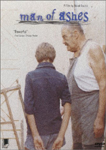

 |
Man
of Ashes
|
 |
|
Ladymol's Review I wonder why so many films and books equate child abuse with gay. This film is not a gay film; itís about child abuse. I think. To be honest it was so dreary, I donít really care what it was about. Impoverished Arab slum, young man about to be married who has bad memories about a man in his youth, and thatís about it.† Iím angry that I sat through it all and wasted an evening. The subtitles seemed very little to do with what was being said and many of them were white writing on a white background, so I couldnít read them anyway. The lead actor was very good looking and really carried the film with his soulful looks, but he wasnít enough to win me over. I kept expecting something between the men to happen, and it didnít. As I said, not gay. Cerisaye's Review This is an unusual film in that itís Tunisian therefore looks at sexuality and male identity from an Islamic perspective.† Hashemi and Farfad live in a small Tunisian town, both of them woodworkers.† Slowly itís revealed through flashback that the boys were abused by Ameur who was their teacher when they were young apprentices, 11 or 12 years old. Handsome Hashemi is about to be married.† When someone scrawls graffiti onto a wall calling into question best friendís Farfadís masculinity and sexual preference, Hashemi relives his childhood trauma, seeing his young self everywhere like a ghost.† Digging up the past is disturbing and Hashemi increasingly retreats, distant from his concerned family who donít have any idea whatís wrong.† Thereís no one Hashemi can talk to.† He is desperately afraid that come his wedding night he wonít be able to perform so heíll be shamed before his new wife and family. The subtext is that Hashemi questions whether heís attracted to women at all. Farfad is a wild child with a reputation his father can no longer tolerate so he gets thrown out of the house. †Farfad knows heís attracted to men though tries to prove he isnít when some friends take him and Hashemi to a brothel on the eve of his friendís wedding to celebrate his final night of freedom.† This has serious consequences as emotional turmoil boils over when one of the other men flirts with Farfad.† At first he plays along but then recoils with violent consequences. I found the story a bit hard to follow and Iím sure I missed a lot.† The subtitling is sometimes inadequate: lengthy dialogue but only a few words of translation.† I couldnít understand why the boys didnít help each other, especially as they had no one else.† I suppose thatís part of the experience of abuse, each ashamed of what happened, blaming himself and trying to repress desire. Both young men are attractive, and give good performances.† Thereís nudity and sex, including brutal rape of a child, which really surprised me in an Arabic film.† It was made in 1986, and I wonder whether the filmmaker would have the same freedom today?† Also thereís a scene where Hashemi goes to see his old teacher who is Jewish and lives happily among Arabs, a man Hashemi treats like a revered grandfather. I felt the boys were more than friends but neither is willing to acknowledge that. They behave melodramatically but thatís probably down to different culture and trying to prove masculinity.† Tradition dictates how men and women must behave.† Fashemiís marriage is arranged and not what he wants.† Both Fashemi and Farfad clash forcefully with their fathers, while their mothers are sympathetic they have no power- though Fashemiís calls in a witch doctor woman to exorcise his demons.† If either or both boys are gay is the film saying thatís because they were raped by a man?† This linking of being gay with paedophilic abuse is questionable though maybe makes it more acceptable in a traditional macho society than to say itís something thatís not a matter of choice.† Both boys appear to blame their unhappiness on their sexuality rather than their abuser.† It makes an interesting contrast with For a Lost Soldier. The ending is quite upbeat despite its serious subject.† The film is different enough to be worth watching, certainly not what I expected.† (Arabic with English subtitles.) |